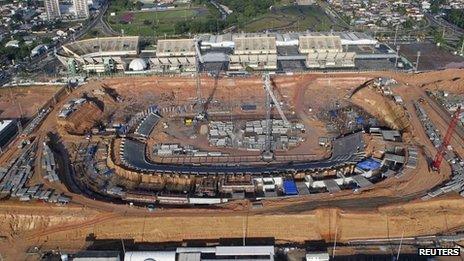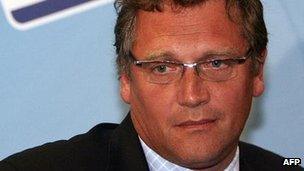World Cup 2014: Fifa's Valcke apologises to Brazil
- Published

Brazil is investing billions in building new stadiums and renovating old ones
The secretary general of football's world governing body, Fifa, has apologised to Brazil for his comments on preparations for the 2014 World Cup.
Jerome Valcke made the apology in a letter to Brazil's sports ministry.
Mr Valcke said last week that Brazil needed a "kick up the backside" and appeared more concerned with winning the World Cup than organising it.
Brazil said the comments were "unacceptable" and it would no longer deal with Mr Valcke.
Sports Minister Aldo Rebelo said Fifa should appoint someone else to work with Brazil on the competition.
The Fifa President Sepp Blatter has also sent a letter of apology, according to the sports ministry.
Mr Blatter wanted "to apologize to everyone who may have had their honour and their pride hurt, especially the Brazilian government and President Dilma Rousseff," the ministry said.
Mr Rebelo has so far not responded to either letter.

Jerome Valcke's remarks have angered many Brazilians
Mr Valcke had also recently expressed frustration at delays in approving a law setting out the regulatory framework for the World Cup.
The World Cup bill - currently being considered by the Brazilian Congress - would lift a ban on alcohol sales in stadiums and limit discount ticket sales to students and pensioners.
But it has been opposed by lawmakers who say it gives Fifa too much power, as well as those who are against alcohol sales in stadiums on health and safety grounds.
The Brazilian government has always said it is determined to deliver a successful World Cup as well as a lasting legacy.
It is investing billions of dollars in building new stadiums and renovating old ones, as well as in transport infrastructure such as roads and airports.
The 2014 World Cup will be the first in South America since Argentina hosted the tournament in 1978 and the first in Brazil since 1950.
- Published3 March 2012
- Published16 February 2012
- Published19 January 2012
- Published2 December 2011
- Published29 February 2012
- Published11 October 2011